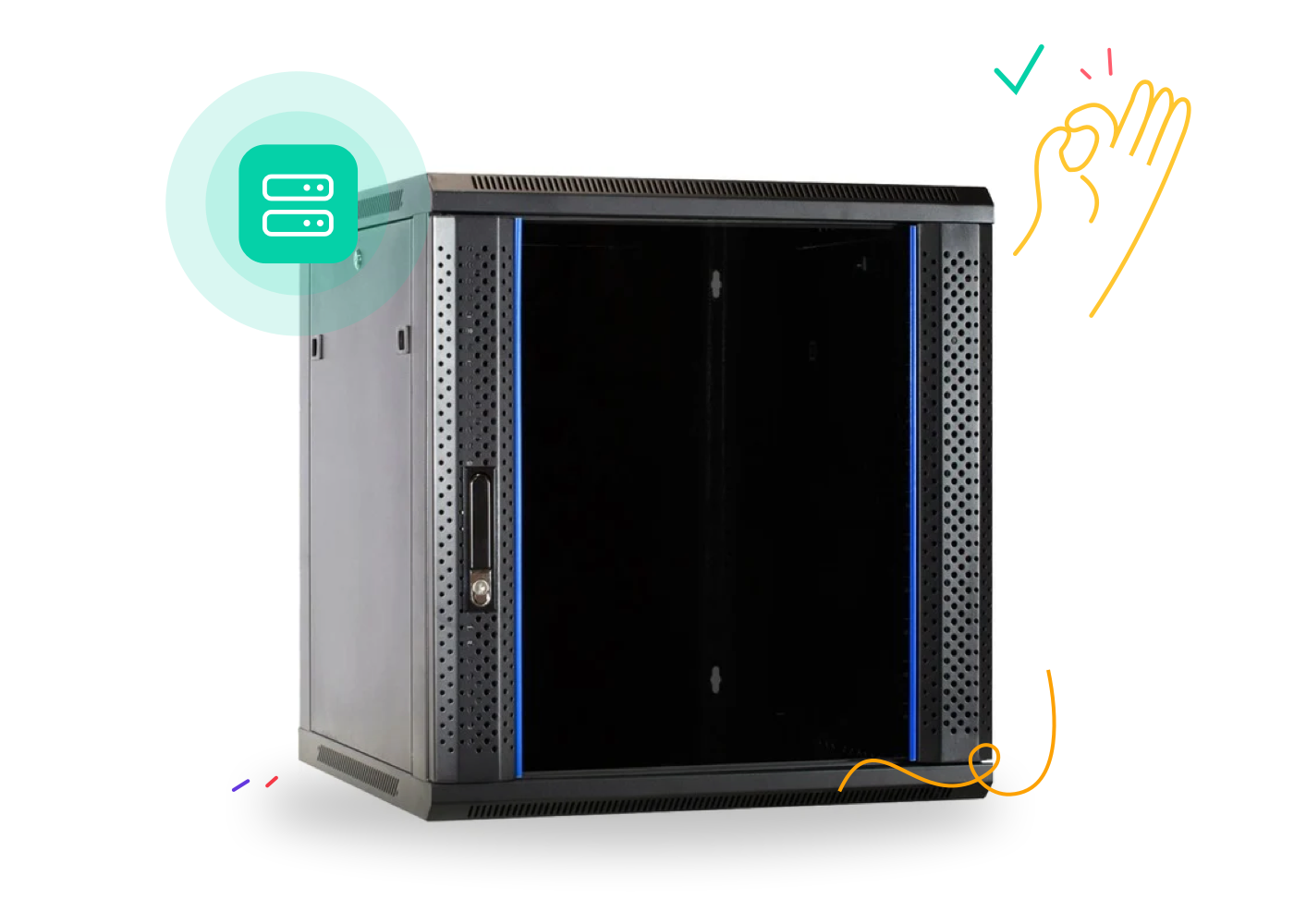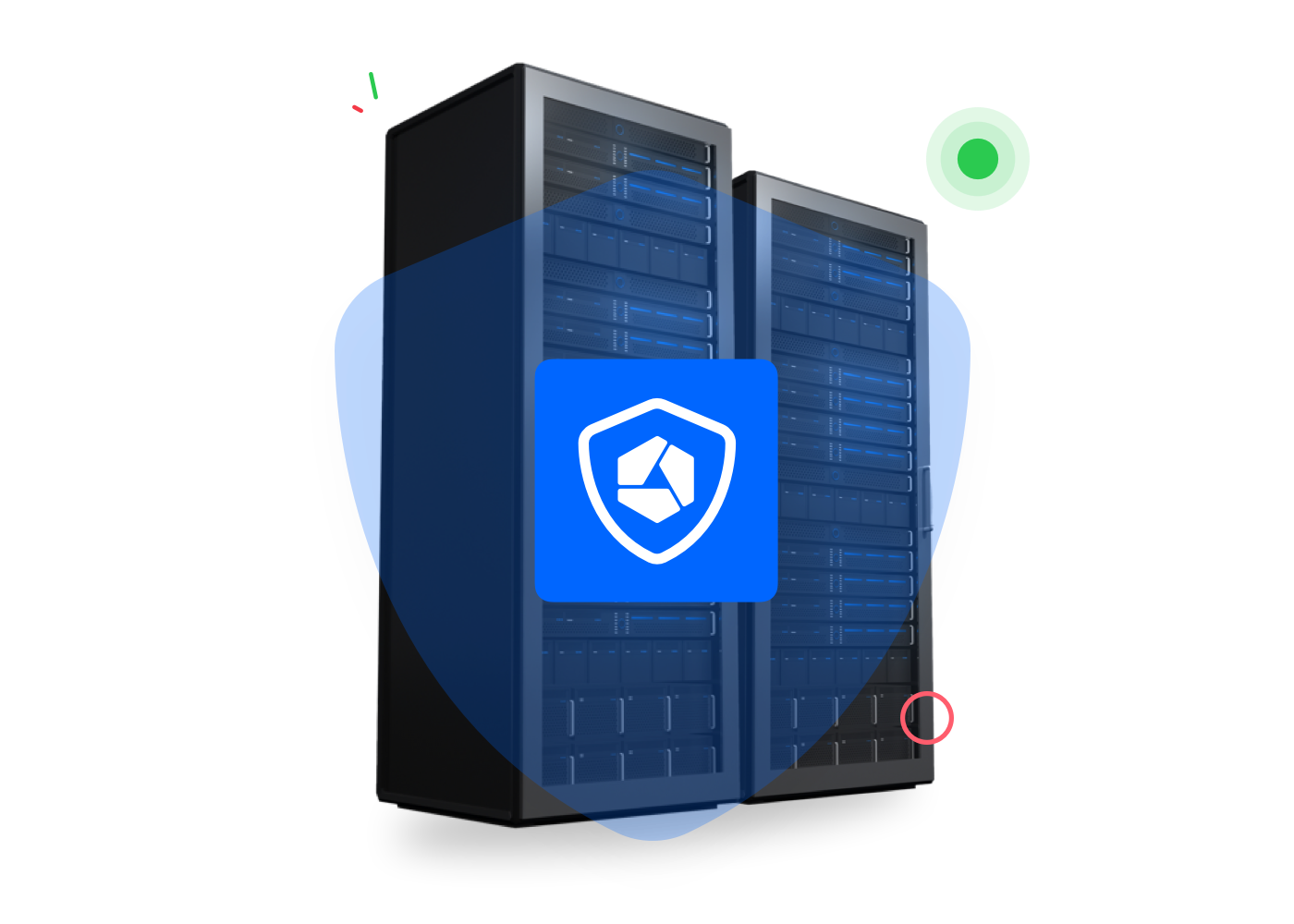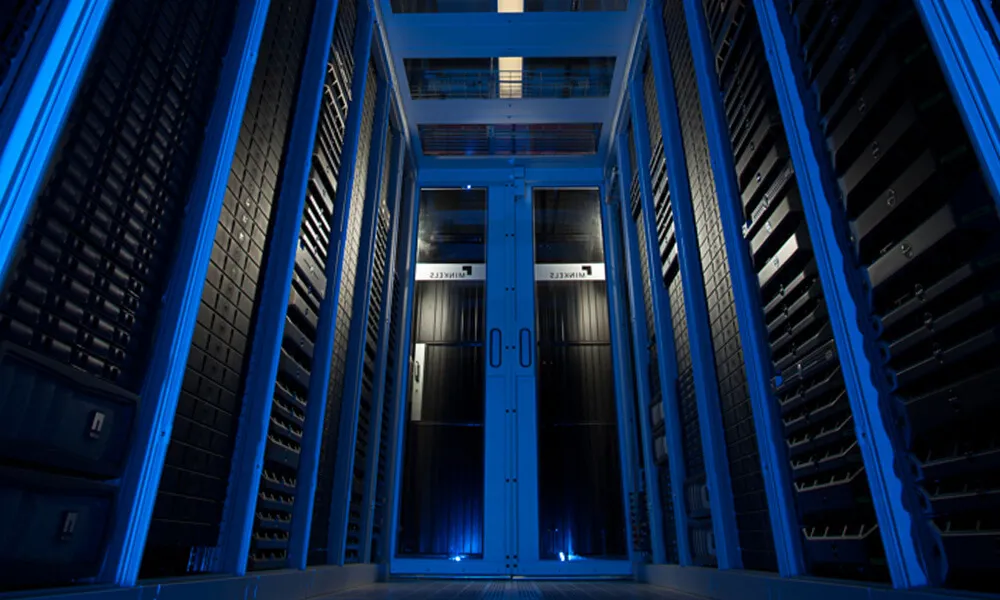Storing equipment in server racks or is it better to move to the cloud?

Searching for the best server hosting solution for your IT environment? In this blog, you will discover the possibilities of both server racks and cloud hosting. Whether you are looking for scalability and flexibility in the cloud or prefer the control and security of a classic server rack, Combell helps you make the right decision for your company. Read on to learn more about both options and which one suits you best.
- What is a server rack?
- Not just another file cabinet!
- Server rack benefits
- There are also limitations ...
- Set your sights on the cloud
- Remote servers
- Combell as cloud provider
- Cyber security and support in your own language
- Advantages of cloud servers
- Already considered a colocation solution?
- Frequently asked questions about a server rack
What is a server rack?
Let's begin by discussing server racks. A server rack is actually a server cabinet in which you place and organize servers and other equipment. It's referred to as a "rack" because it acts as a "shelf" for storing equipment. The rack usually consists of vertical rails in which the equipment can be mounted.
A server rack is typically located in your company's server room, known as on-premises infrastructure, meaning your server or servers are situated at your office.
Airflow and cooling
You can recognize a server rack by the openings on the front and back for airflow and cooling to keep equipment at optimal temperatures. In addition, server racks often have cable management panels and vertical cable entry to keep cabling tidy in place.
That's helpful for maintenance! And that way you don't stumble over all the wiring. 😉 In addition, racks can be equipped with doors, side panels and locks to restrict access to equipment and improve the security of your server(s).
A server rack serves as a frame or enclosure for your network equipment. The rails of the rack are numbered in what are called 'rack units', expressed in "U". Each unit corresponds to 1.75 inches (4.45 cm) in height. So you sometimes hear about '...inch server racks'.
Man of steel
Standard racks usually have a height of 42U, 45U or 48U. The width of a rack is usually standardized at 19 inches (48.26 cm), which corresponds to the width of the equipment mounted in it. The depth of a rack usually varies, depending on the space you need for equipment and cable management.

If you choose a server rack, then you will have your own Man of Steel at your office. Because server racks are made of durable and rock-solid materials such as steel and aluminum. Although the choice of material depends mainly on the size of the equipment and the weight the rack has to carry.
Different types of server racks
If you surf around the internet, you will quickly notice that there are different types of server racks. That's because you need to choose an appropriate server rack according to your business needs. Factors such as available space, desired security level, and access options are crucial in selecting a server rack.
- Open frame racks do not have side panels or doors, allowing easy access to the equipment. Open frame racks are especially useful in "environments" where easy accessibility and airflow are emphasized.
- Closed-frame racks have side panels and doors, protecting equipment from dust, dirt and unauthorized access. These types of racks provide additional security and improved cooling efficiency.
- Wall-mount racks are designed to be wall-mounted and are ideal for small office environments or locations with limited space.
- Blade server racks are specifically designed to house blade servers. They provide a standardized and optimized environment for these compact and powerful servers.
Tip
Blade servers are small servers that are placed in a shared housing, saving space and making them easy to manage. In this additional blog post, you'll learn even more about servers. We even explicitly explain what a web server is.
Not just another file cabinet!
By the way, don't just say cabinet to an outstanding server rack! These cabinets can handle more than one hit. Server racks therefore protect the physical equipment of your IT infrastructure. So you better handle them with care.
Server racks usually have ultra-secure doors and (electric) locks. This way, no one with bad intentions can open your rack. Preventing unauthorized access is also one of the reasons why rack side panels are so important. Working with fingerprint scanners or badges, can be an additional measure. That way, only certain individuals can access your server rack.

Taking it a step further, you can choose server racks with integrated monitoring and security systems. At the slightest threat, you'll get an instant alert.
And what about threats from outside? Your rack is equipped for that too! For example, to prevent equipment damage from power surges and lightning strikes, it is essential to equip server racks with grounding systems and lightning protection measures, which redirect and minimize electrical peaks.
Server rack benefits
Although on-premise server racks come with high costs, they also have some interesting benefits. We don't want to keep those from you!
Thanks to server racks, you can provide a standardized and organized environment at your company for storing and managing servers and other IT equipment.
With sturdy doors (like a perforated door), locks and side panels, you restrict access to your equipment. This helps protect sensitive business data from misuse or theft!
Server racks are designed with openings on the front and back, which provides good airflow and also improves the cooling of your equipment. This way, you reduce the risk of overheating.
If you prefer your infrastructure old school in the office, server racks are an efficient solution if you have limited space. Because you can store multiple servers and other IT equipment in a limited space.

There are also limitations ...
While there are some advantages to maintaining an on-premises server rack, for most companies these on-premises advantages outweigh the many disadvantages.
Purchasing server racks, providing cabling, power, cooling, security ... These are all expense items that startups should really avoid. Not to mention the cost of management and maintenance.
Whether you are a one-man business or have staff, you should always focus on the essentials of your business. Investing time (and a salary) in maintaining and updating your server rack is not one of them. Yet all repairs and problems end up on your shoulders.
You may still provide the best secured cabinet, but there will always be a risk of theft, human error or physical damage from unforeseen circumstances, such as fire or natural disasters, among others.
Tip
Don't let a disaster affect the operation of your business. Therefore, opt for Business Continuity.
Server racks have physical limits in terms of capacity and scalability. That's a big disadvantage. Because if you need a new server or additional server resources, you're probably going to have to buy more racks. You might have guessed it: that will also add costs.
Set your sights on the cloud
With those drawbacks in mind, it's a good idea to explore the possibilities of cloud computing. The cloud can be a perfectly scalable and secure replacement for your server rack in the caverns of your company ... or as a complement. After all, with cloud hosting, you control the options.
Remote servers
Cloud computing means you work with remote servers at a cloud provider. You use (part of) a collection of servers to store your data and backups. You can also call a server with a provider "infrastructure as-a-service": you rent your infrastructure from a cloud provider, and pay a fixed price for its use and maintenance.
There are various options: you can choose your own private cloud, where you use a completely separate cloud environment, or you can use a "public cloud", where you share infrastructure with other cloud users.
Combell as cloud provider
Did someone say cloud provider? 😃 Here at Combell, we are eager to guide you worry-free to the cloud. Any doubts? No problem. Because we understand very well that we have big responsibilities when it comes to cloud computing. But trust us: you are in very capable and experienced hands.
Opting for cloud computing with a local provider like Combell provides you with a dedicated server, complete with its own Service Level Agreement (SLA) and performance assurances. With a provider, you can also opt for managed cloud. In that case, we take care of the entire maintenance of your cloud environment.
Tip
A Service Level Agreement records the agreements between you and Combell. This way, you can be sure that you get solution guarantees within a fixed response time.
Even though your server is virtualized and you do not need your own hardware, you keep control over your data. However, sometimes, as a company, you choose to keep certain data 'on-premise'. That's no problem at all!
Explore the hybrid cloud
Don't want or can't say goodbye to your server rack at your office? But at the same time, you've realized the numerous advantages of cloud servers? Then a hybrid cloud solution is exactly what you need. With hybrid cloud (e.g. combination of public cloud and private cloud), it is perfectly possible to use cloud resources in combination with your own infrastructure. The experts here at Combell take care of this process. As a result, you no longer experience any worries! Perhaps, eventually, you will switch completely to the cloud. That is entirely up to you.
Cyber security and support in your own language
At Combell, we protect your cloud environment with the highest security measures. Our ultra-secure data centers are located in Belgium and the Netherlands, so you always know exactly where your data are.
We actively protect your cloud environment against security risks such as hacking or data theft. Using firewalls, advanced security protocols and regular security audits and tests, we make sure your data is safe.

At Combell, we do not only offer professional advice, but also the best support. We have a team of support collaborators who can help you in Dutch, French or English. They are available 24/7 and go straight to work to solve your problems. Unlike foreign call centers, we offer personal and direct support, without standard help talk.
We strive to be not only a reliable cloud provider, but also a partner who understands your needs and actively works with you to find the best solutions for your IT services.
Advantages of cloud servers
Security is the biggest advantage of a cloud server. When you use a professional host, you can be sure of the optimal security of your data.
You pay a fixed monthly cost, and do not have to make a large investment. Repairs and maintenance are included. Of course, your costs do increase when you need more capacity - but less sharply than when you own your own server.

With the cloud, you make use of a (part of a) collection of servers, using those servers optimally. That server collection is linked together, and users get their own 'virtual cloud server' on it. Of course, this is all done with the utmost care for the security of your data.
You don't have to worry about updates or maintenance: a good host intervenes at the right moments. So you can always be sure of the best possible operation of your server.
Your company is growing? Then your server grows with it, without delay or installation period. Would you rather downsize? Your server is perfectly scalable. Even automatically thanks to autoscaling.
Your cloud host will ensure that your data is unavailable as little as possible. And you can reach your servers from anywhere!

Download our cloud ebook
Curious about the complete picture of the benefits and possibilities of the cloud? Our e-book will guide you every step of the way!
Already considered a colocation solution?
While on the topic, we'd like to offer one final tip regarding server racks in your office. 😉 Instead of switching completely to the cloud, you can also place your servers in our server rooms. Such services are also called 'Colocation' in the IT world.
We provide both unmanaged colocation and managed cloud solutions and all managed combinations in between. This way, anyone can come to us no matter what your needs are. Our solutions simply grow with your business.
At Combell, we place your own servers in our exclusive colocation data centers, which are completely separated from our other infrastructure. We have co-location sites in the Antwerp, Brussels and Ghent regions.
There, your servers are protected against burglary, fire, natural disasters, and more. Moreover, we provide the fastest, most reliable and secure connections to and from our data centers. So you are guaranteed to stay online! 😄
By choosing Combell's colocation services, you can outsource all your infrastructure concerns. You can focus solely on the data that runs on your server while we handle the physical security. 😄


